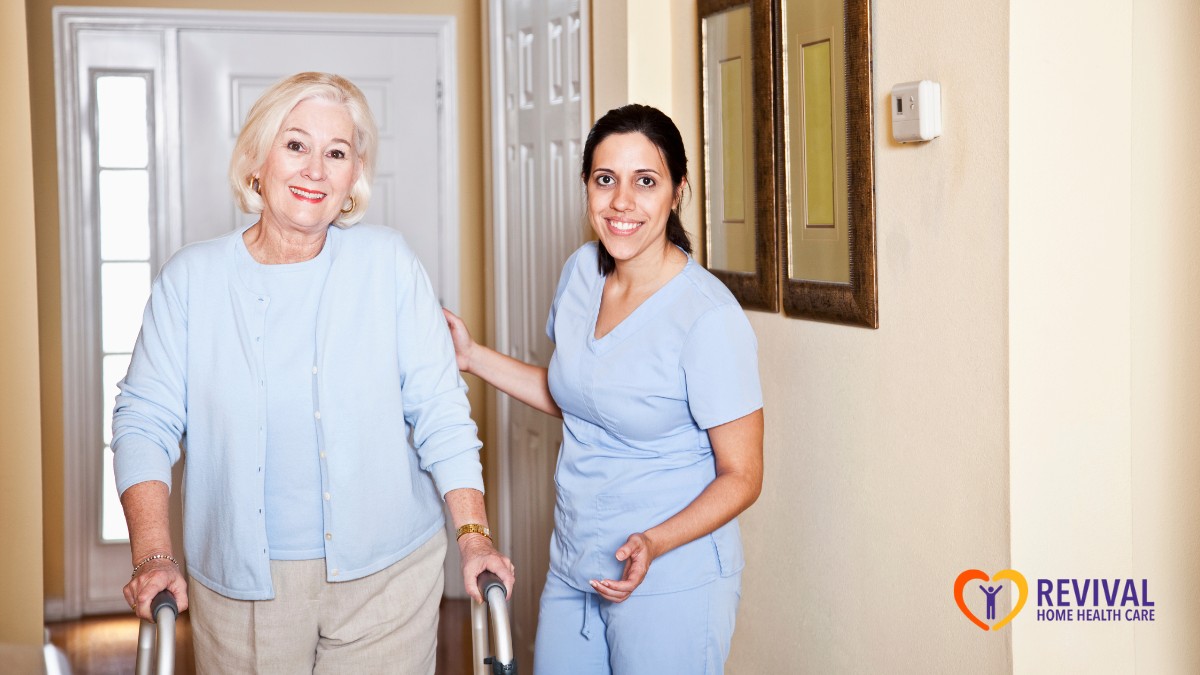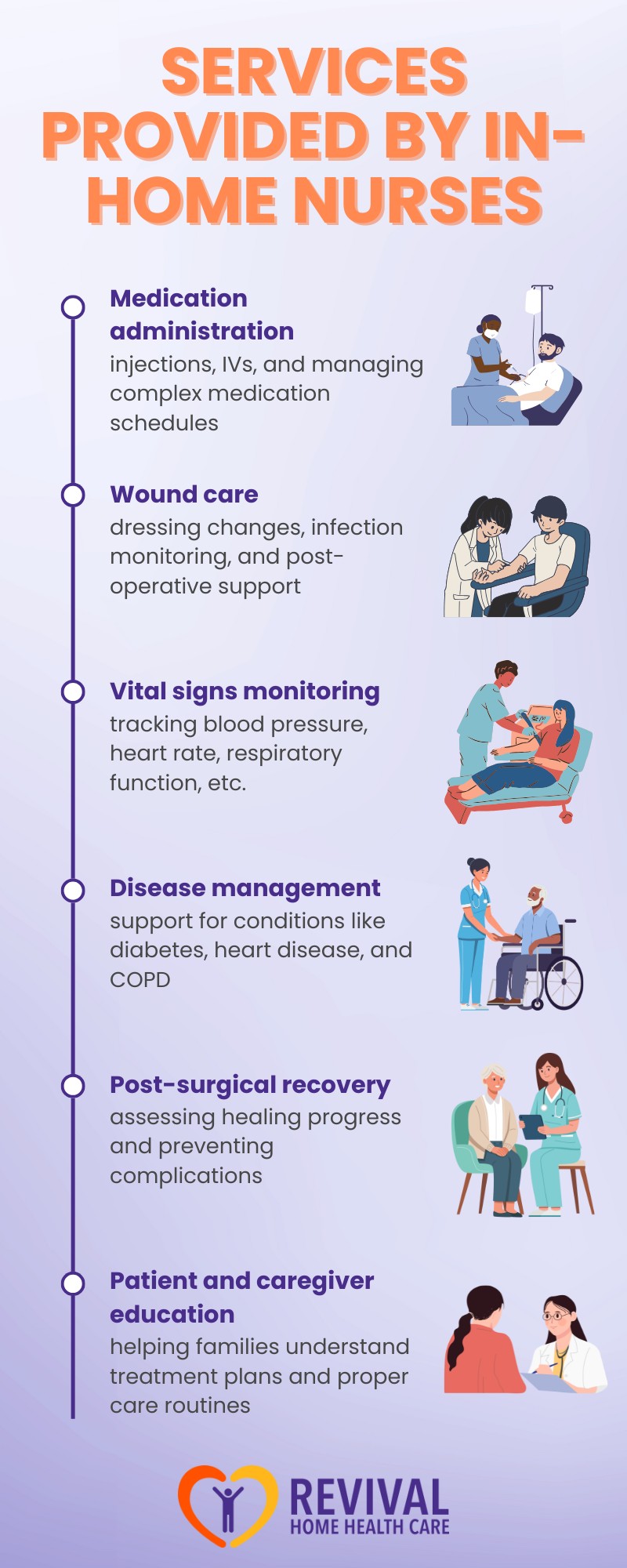Key Points:
- Home health aides assist with daily living tasks, while in-home nurses provide skilled medical care that requires clinical training.
- The level of training, scope of services, and medical responsibilities are key differences between the two roles.
- Understanding the difference helps families choose the right type of support for their loved one’s health and personal care needs.
Trying to find the right kind of care for a loved one—or even for yourself—can feel confusing and overwhelming. You may have come across terms like home health aide and in-home nurse, and wondered: What’s the difference?
Choosing the right level of care is essential for safety, comfort, and peace of mind. This article is here to clear up the confusion. We’ll walk you through what each role entails, how they differ, and who can benefit from each. Whether you’re caring for a senior parent, someone with a chronic illness, or a recovering patient, understanding these roles will help you make informed, confident choices.

What Is a Home Health Aide?
A home health aide (HHA) is a trained professional who assists individuals with daily living activities in their homes. Their primary focus is on non-medical support, helping people stay independent and safe in familiar surroundings.
Common Responsibilities of a Home Health Aide
While duties can vary depending on the person’s condition and care plan, home health aides typically help with:
- Personal hygiene: bathing, grooming, and dressing
- Mobility support: transferring from bed to chair, walking assistance
- Meal preparation: planning and cooking simple, nutritious meals
- Light housekeeping: laundry, tidying up, and making the home safer
- Companionship: offering social interaction and emotional support
- Basic health monitoring: noting changes in condition and reporting to supervisors
It’s important to note that HHAs do not perform clinical medical tasks. They may monitor a client’s condition and report concerns, but they do not provide treatments or manage medications independently.
What Is an In-Home Nurse?
An in-home nurse—usually a Registered Nurse (RN) or Licensed Practical Nurse (LPN)—delivers skilled medical care to patients in their homes. This type of care is often prescribed by a physician and requires professional clinical training.
Services Provided by In-Home Nurses
In-home nurses handle a wide range of medical responsibilities, including:

In-home nurses work closely with physicians and may coordinate with physical therapists or other specialists to support the patient’s overall care plan.
The Key Differences Between Home Health Aides and In-Home Nurses
Although home health aides and in-home nurses often work side by side, their roles and qualifications are distinctly different. Understanding these differences helps ensure the right care is provided at the right time.
1. Level of Training
One of the most significant differences is education and certification.
- Home Health Aides complete a training program (usually around 75 hours) and may need certification, depending on state regulations.
- In-Home Nurses are licensed medical professionals. RNs hold associate or bachelor’s degrees in nursing, while LPNs complete a practical nursing program and pass licensing exams.
This difference in training is what allows in-home nurses to perform complex medical tasks that HHAs cannot.
2. Scope of Care
The services each provides vary significantly:
- HHAs focus on personal care and support, such as hygiene and light household duties.
- In-home nurses provide clinical care, including medical treatments, monitoring, and managing health conditions.
If your loved one needs help with basic tasks like bathing or meal prep, an HHA may be enough. If they require wound care, injections, or disease monitoring, a nurse is likely necessary.
3. Supervision and Oversight
In terms of supervision and oversight, there are notable differences as well.
- Home health aides often work under the supervision of a nurse or care manager.
- In-home nurses work more independently and may even supervise HHAs as part of a larger care team.
This dynamic ensures that each professional works within their scope while contributing to a well-rounded care plan.
4. Cost and Insurance Coverage
Costs vary depending on location and insurance coverage.
- In-home nursing care is more likely to be covered by health insurance or Medicare/Medicaid if it’s prescribed by a doctor.
- Home health aide services may be covered under long-term care insurance or private pay, depending on the situation.
Be sure to check with your insurance provider or care coordinator to understand your options.
Which One Do You Need?
Choosing between a home health aide and an in-home nurse depends entirely on your or your loved one’s specific needs.
When a home health aide is a good fit:
- The person needs help with bathing, grooming, or dressing.
- They require companionship or supervision throughout the day.
- Light housekeeping and meal preparation are needed.
- There’s no complex medical treatment involved.
When in-home nursing care is needed:
- The individual has a chronic illness or complex medical condition that needs oversight.
- Wound care, catheter management, or injections are required.
- Post-surgical care and health monitoring are needed after a hospital stay.
- Medication needs to be administered or managed by a licensed nurse.
In many cases, families may find that a combination of both services offers the best balance—nursing care for medical needs, and a home health aide for daily living support.
Questions to Ask When Choosing the Right Care
To ensure you’re choosing the right level of care, consider asking the following:
- What are the patient’s current medical and daily living needs?
- Has a doctor recommended any specific home health services?
- Are there any safety concerns at home that need to be addressed?
- What tasks are family members able or willing to help with?
- What does insurance cover, and what services will require out-of-pocket payment?
Being honest about the situation and future needs can help guide the best care decision now and in the months ahead.
Get Professional In-Home Nursing Care in New York
If your loved one requires in-home nursing care in New York, Revival Home Health Care offers compassionate, skilled support delivered by licensed professionals who truly care.
Whether you’re managing a chronic illness, recovering from surgery, or seeking help with daily medical routines, our in-home nursing services are tailored to fit your unique needs. With Revival, you gain peace of mind knowing a qualified nurse is available to provide consistent, high-quality care right in your home.
Contact us today to learn more about in-home nursing care and how we can help you or your loved one feel safe, supported, and well cared for—right where it matters most.


 75 Vanderbilt Ave Staten Island, NY 10304
75 Vanderbilt Ave Staten Island, NY 10304 info@revivalhhc.org
info@revivalhhc.org 718.629.1000
718.629.1000